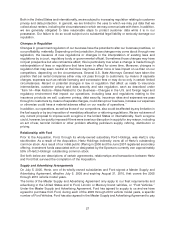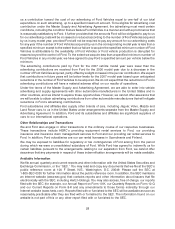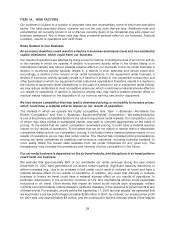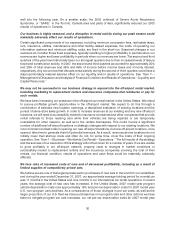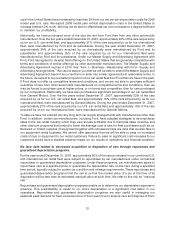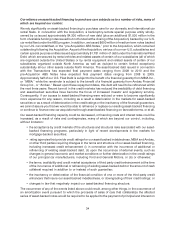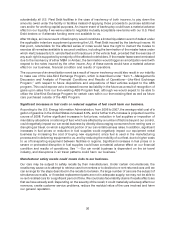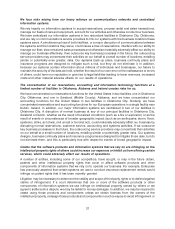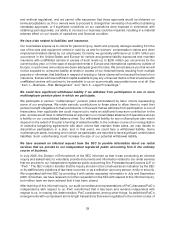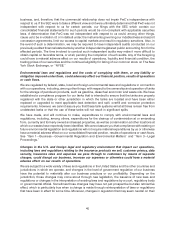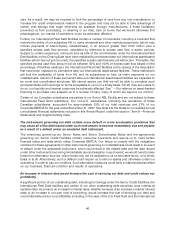Hertz 2007 Annual Report Download - page 57
Download and view the complete annual report
Please find page 57 of the 2007 Hertz annual report below. You can navigate through the pages in the report by either clicking on the pages listed below, or by using the keyword search tool below to find specific information within the annual report.We face risks arising from our heavy reliance on communications networks and centralized
information systems.
We rely heavily on information systems to accept reservations, process rental and sales transactions,
manage our fleets of cars and equipment, account for our activities and otherwise conduct our business.
We have centralized our information systems in two redundant facilities in Oklahoma City, Oklahoma,
and we rely on communications service providers to link our systems with the business locations these
systems serve. A simultaneous loss of both facilities, or a major disruption of communications between
the systems and the locations they serve, could cause a loss of reservations, interfere with our ability to
manage our fleet, slow rental and sales processes and otherwise materially adversely affect our ability to
manage our business effectively. If we outsource key business processes in the future, the outsourcing
service providers may concentrate their activities on our behalf at a small number of locations, entailing
similar or potentially even greater, risks. Our systems back-up plans, business continuity plans and
insurance programs are designed to mitigate such a risk, but they do not eliminate it. In addition,
because our systems contain information about millions of individuals and businesses, our failure to
maintain the security of the data we hold, whether the result of our own error or the malfeasance or errors
of others, could harm our reputation or give rise to legal liabilities leading to lower revenues, increased
costs and other material adverse effects on our results of operations.
The concentration of our reservations, accounting and information technology functions at a
limited number of facilities in Oklahoma, Alabama and Ireland creates risks for us.
We have concentrated our reservations functions for the United States in two facilities, one in Oklahoma
City, Oklahoma, and one in Saraland (Mobile County), Alabama, and we have concentrated our
accounting functions for the United States in two facilities in Oklahoma City. Similarly, we have
concentrated reservations and accounting functions for our European operations in a single facility near
Dublin, Ireland. In addition, our major information systems are centralized in two of our facilities in
Oklahoma City. A disruption of normal business at any of our principal facilities in Oklahoma City,
Saraland or Dublin, whether as the result of localized conditions (such as a fire or explosion) or as the
result of events or circumstances of broader geographic impact (such as an earthquake, storm, flood,
epidemic, strike, act of war, civil unrest or terrorist act), could materially adversely affect our business by
disrupting normal reservations, customer service, accounting and systems activities. If we outsource
key business processes in the future, the outsourcing service providers may concentrate their activities
on our behalf at a small number of locations, entailing similar or potentially greater risks. Our systems
designs, business continuity plans and insurance programs are designed to mitigate those risks, but do
not eliminate them, and this is particularly true with respect to events of broad geographic impact.
Claims that the software products and information systems that we rely on are infringing on the
intellectual property rights of others could increase our expenses or inhibit us from offering certain
services, which could adversely affect our results of operations.
A number of entities, including some of our competitors, have sought, or may in the future obtain,
patents and other intellectual property rights that cover or affect software products and other
components of information systems that we rely on to operate our business. For example, Enterprise
has previously asserted that certain systems we use to conduct insurance replacement rentals would
infringe on patent rights that it has been recently granted.
Litigation may be necessary to determine the validity and scope of third-party rights or to defend against
claims of infringement. If a court determines that one or more of the software products or other
components of information systems we use infringe on intellectual property owned by others or we
agree to settle such a dispute, we may be liable for money damages. In addition, we may be required to
cease using those products and components unless we obtain licenses from the owners of the
intellectual property, redesign those products and components in such a way as to avoid infringement or
37


